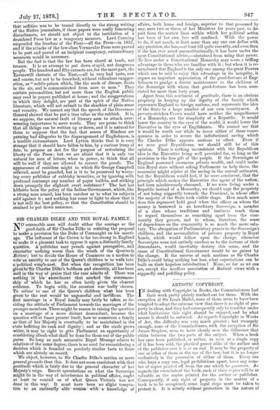CHARLES DTLKE AND THE ROYAL FAMILY.
VO'reasonabIe Inuit will doubt either the coniage or the good-faith of Sir Charles'Dilke in tetieting the' proposal to 'tare's provision'fOr the Duke of Connaught' on his marri- age. The influence of the Crown is far too strong in England teinaire it a pleasant task to oppose it upon a dietinctlyfamily qiietitibri: A' politician may -preach' againat prerogative, and enionfiter nething worse' than the 'wrath of the Qatirtei•ly RkitilY; but to divide-the flonge 'of' Cbnimons on a inotibit to *a:e'en anniiitY to- one of the"Qiietes Children is- to -walk into epoliticál vrneeti-nest. putt when dtte 'recognition has 'been givefittiSir Oharlei Nike's" boldness and sincerity,' all lee been Sad .inllitt-tiay 'of praise L.that the 'bite adinits Of. There was nothing his anieridinent that niarked the– stateirman- ship or Which he has so often lately given' the clearest' eVideiree. TO begin -with, the ()edition wes'' badly 'chosen. To refithe'td' one "of -the' Queen's children 'whit hit' been given to the. 'rest would- be' ungraceffil'and-indidiona. The firet Marriage' in a Iteyal faraily may fairly be 'taken ae de- ciding the attitude of Parliament towards the marriages of the younger members. There might be reason in raising the question on a marriage of a more distant descendant, because the tit:legion will at times present. itself, hoW'iti' nun:lei-out 'a family as'that of her Majesty is eventually to' be maintainednin the state befitting its' rank and dignity ; and- as the circle grows wider, it may be right to giite 'Parliament an opportunity of considering afresh what shall be done for them out ,t)f the -public purse. So long as 'each sticcessiVe 'Royal Meislige relates to relatives Of the-sanse 'degree', thereis no need for reconsidering a decision which is foiiiided on precisely similar -facts to those which are' already on recritd:' We object, however, to Sir Charles- Dilke's inotion on more general grounds than this. It does not seem'conaistent 'With that gratitude which is fairly dina to the general' character of her Majesty's reign. Recent speculations on what the 'Sovereign Might de in the way of interferetiee in 'political' affairs, ought at least to remind us of what Queen Victoria has not &tie' in this. way; It must have been- na slight tempta- tilfsh 'to einitiently weilaf' with' a–knowledge of affairs, both home and foreign, superior to that possessed by any, save two or three, of her Miniaters for years' past, to de- part from the narrow lines within which her political action has been of her own free will confined. With the power to do, if not much, at least more than any one can define with any precision, she has,—at least till quite recently, and even then if she has ever acted unconstitutionally, it has been under the most Constitutional advice,—abstained from using that power. To live under a Constitutional Monarchy may seem a trifling advantage to those who are familiar with it ; but when it is re- membered that England is the only one among the great Powers which can be said to enjoy this advantage in its integrity,-it argues an imperfect appreciation of the good-fortune of Eng% lishmen to grudge a decent maintenance to the children of the Sovereign with whom that good-fortune has been asso, ciated for more than forty years.
Apart from this sentiment of gratitude, there is an obvicaiS propriety in keeping up the dignity of the family which represents England to foreign nations, and represents the idea of the State to a large number of our own countrymen. A poverty-stricken Crown would have neither the magnificence of a Monarchy, nor the simplicity of a Republic. It would lower the country in the eyes of the world, it would lower thi Executive in the eyes of Englishmen. We cannot see that it would be worth our while to incur either of these tonsel quences in order to secure the infinitesimal saving which Sir Charles Dilke appears anxious to effect. Even if we were good Republicans, we should still be of this opinion. There is nothing inconsistent with the Republican idea in the Executive being well provided for, so long as the provision is the free gift of the people. If the Sovereigns of England possessed enormous private wealth, and could main- fain Royal state without asking Parliament to help them, the economist Might rejoice at the saving in the annual' estimates., but the Republican would feel, if he were consistent; that thd principle which makes the Executive the agent of the" nation; had been mischievously obscured. If we were living under a Republic instead of a Monarchy, we should urge the propriety of not being niggardly towards the President, in whose office the majesty of the State took visible shape. How nruch more does this argument hold good when the officer on whom the money is bestowed is an hereditary Sovereign, a member of a class whose traditions and instincts teach them to regard themselves as something apart from the com- munity they govern, and to whom, therefore, the senee of dependence on the community is so much the more salu- tary. The abrogation of Parliamentary grants to the Sovereign's children, and the accumulation of private property in Royal hands, which would follow upon the change, whenever Sovereigns were not entirely careless' as to the fortune of their deScendants, would inevitably destroy this sense, and the cause of Constitutional Government would be no gainer by the change. If the success of such motions as Sir Charles Mike's could bring nothing but loss' what expectations can be built on their hopeless introduction? None, so far as wd can see, except 'the needless association of Radical viewe'vrith a niggardly and peddling policy.


































 Previous page
Previous page